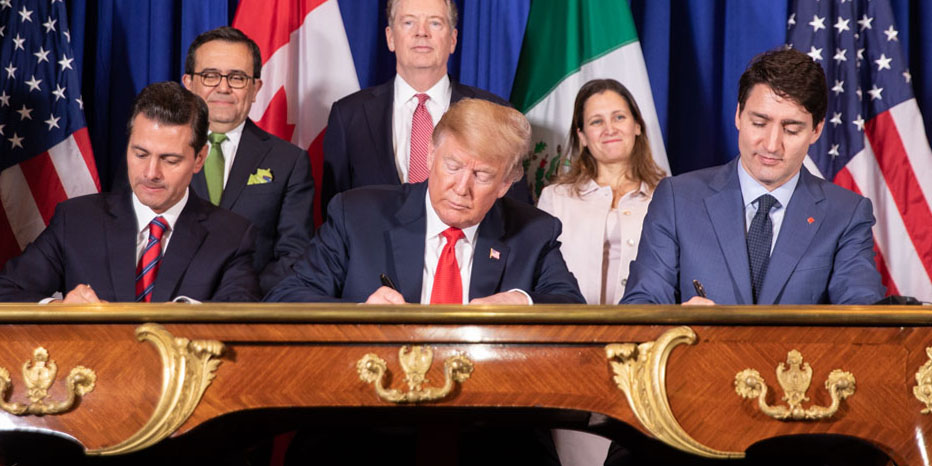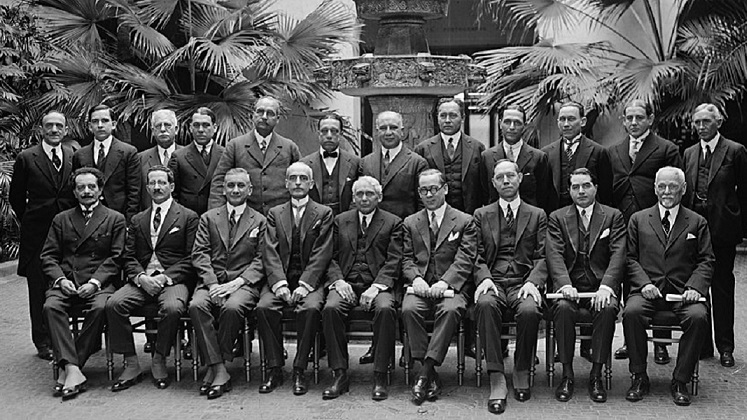

 Donald Trump ran for office with a vow to renegotiate or scrap 1994’s North American Free Trade Agreement (NAFTA), and by the end of 2018 its replacement, the US-Mexico-Canada Agreement (USMCA), had been signed. New research from Dimitrios Bakas (Nottingham Trent University), Karen Jackson (University of Westminster), and Georgios Magkonis (University of Portsmouth) finds that a collapse of the old NAFTA deal would have hurt Mexico the least and the US the most, but overall this “NAFTA 2.0” is beneficial to all sides in an era of growing uncertainty in international trade.
Donald Trump ran for office with a vow to renegotiate or scrap 1994’s North American Free Trade Agreement (NAFTA), and by the end of 2018 its replacement, the US-Mexico-Canada Agreement (USMCA), had been signed. New research from Dimitrios Bakas (Nottingham Trent University), Karen Jackson (University of Westminster), and Georgios Magkonis (University of Portsmouth) finds that a collapse of the old NAFTA deal would have hurt Mexico the least and the US the most, but overall this “NAFTA 2.0” is beneficial to all sides in an era of growing uncertainty in international trade.
Regionalism has entered a new phase, with mega-regional trade negotiations collapsing (for example, the Transatlantic Trade and Investment Partnership, TTIP) and unexpected withdrawals from longstanding integration schemes (for example, Brexit).
Deep divisions and turmoil over trade issues have been epitomised by the uncertain future of the North American Free Trade Area (NAFTA), where President Trump called for a renegotiation of the deal. This environment has led to questions about the effects of a ‘break-up’ shock. Much less is known about the effect of negative integration shocks compared to trade integration.
The United States-Mexico-Canada Agreement
A new agreement is on the table: the United States-Mexico-Canada Agreement (USMCA) or NAFTA 2.0. However, these are unpredictable times and there is still a great deal of nervousness about getting this deal into law. It has been signed by all three countries, but to date only ratified by Mexico. The US also has a presidential election looming, which could derail the deal altogether.
Nevertheless, there is good reason to feel relief, since consensus was eventually reached following a very chaotic set of negotiations. Furthermore, the changes in the new deal are not really all that dramatic and no country looks to have made significantly more concessions than any other.

Beyond the detail of the proposed deal and the interests of particular groups, what does it mean for Canada, Mexico and the US?
Perhaps the most important outcome is a sense of order and certainty. Until recently, trade economists did not really need to consider the impact of policy uncertainty as trade deals were long-drawn-out affairs. However, large movements in world prices – or trade shocks – are starting to become a regular occurrence in the trade world, and so economists have started to consider their impact.
Firstly, in simple terms, trade policy uncertainty could be interpreted as a trade barrier. Secondly, these shocks or surprises may have knock-on effects on macroeconomic fundamentals such as consumption, investment, and gross domestic product.
Examining the effect of trade shocks
Our work is the first study that explores trade shocks using a framework known as structural panel vector autoregression, which allows us to examine the effect of a shock on various macroeconomic indicators for the three members of NAFTA (Mexico, Canada, and the US). This framework enables us to assess and test the potential linkages and spillovers amongst the NAFTA economies when faced with an unexpected (disintegration) shock.
Our research shows that the collapse of NAFTA could have exposed the US economy to the highest losses, while the Mexican economy would have been least affected.
Canada has already started to diversify its export markets by signing new trade deals (for example, the Comprehensive Economic and Trade Agreement with the European Union and the Trans-Pacific Partnership with Pacific Rim countries), which are likely to further mitigate the negative effects of a potential collapse of NAFTA.
In terms of Mexico, the country would experience non-tariff barrier reductions (for example, by avoiding the NAFTA rules of origin) by trading under World Trade Organisation rules, thereby helping to overcome associated tariff increases.
US consumers, on the other hand, would see higher prices due to increases in trade costs, with the potential for additional US welfare loss due to any retaliation from Mexico and Canada.
Overall, our findings suggest that a sudden (unexpected) negative shock on the integration of the NAFTA bloc damages the US.
Outside the NAFTA bloc, the USMCA deal is likely to be positively received. The text of the deal does not suggest that the US has received substantial concessions – in other words the deal offers advantages and disadvantages for all three countries. Neither does it represent a big change from the current NAFTA deal. Yet countries like the UK, which could potentially want to strike a trade deal with the US, will still need to navigate a path through the uncertainties involved in this tripartite deal.
Sudden negative shocks are an unwelcome addition to the trade environment, so even if the USMCA still has to be ratified by the US and Canada, the very fact that it is on the table represents a positive.
Notes:
• The views expressed here are of the authors rather than the Centre or the LSE
• This article draws on the authors’ paper Trade (Dis)Integration: The Sudden Death of NAFTA (2018)
• This article is a slightly modified version of one originally published by LSE USAPP
• Please read our Comments Policy before commenting





